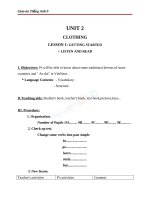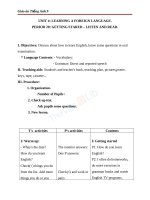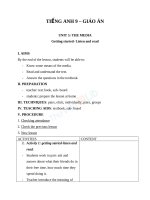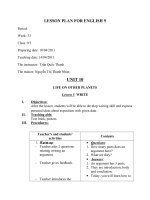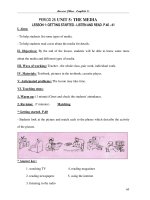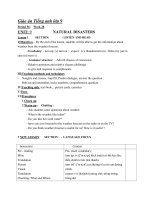Giáo án Tiếng Anh 9: Unit 2. Clothing
Bạn đang xem bản rút gọn của tài liệu. Xem và tải ngay bản đầy đủ của tài liệu tại đây (1.73 MB, 31 trang )
Welcome to
our class
Grade 9
UNIT 2
CLOTHING
LANGUAGE FOCUS
1. PRESENT PERFECT
2. PASSIVE VOICE (REVIEW)
Independence palace
Notre-Dame Cathedral
1. THE PRESENT PERFECT
1. Usage:
- Talk about unfinished actions that started in the past and continue
to the present. Usually use this tense with since or for.
Ex:
I have lived in HO Chi Minh City for 20 years.
Now
Past
1997
2017
I have known him since 2000.
For + a period of time
Since + a point of time
Future
- Talk about life experience that happened sometime during a
person’s life. We often use the words “never” and “…times”.
Ex:
They have visited Paris three times.
My mother has never cooked this kind of food before.
- Talk about recently completed actions. We often use
“Just”, “already”, “recently”.
Ex:
He has just played basketball with his friends.
We have already moved to our new house.
I have been to London recently.
- Want to know if someone has done something before or
not. Usually we use “ever”. This word is often used in
question forms.
Ex:
Have you ever gone to Ha Noi?
Has she ever taken part in any English clubs?
- Talk about something which is expected to happen. It often
goes with “yet” and it is used in question and negative forms.
Ex:
Has he finished his homework yet?
He has not finished his homework yet.
Note:
+ Ever, just, already come in mid-position
Yet, recently come at the end of the sentence.
+ Been or Gone?
Ex:
- I have been to Da Lat on holiday three times. (you
visited Da Lat and then already returned)
- She has gone to Hue, she will be back next week.
(she visited Hue but she has not come home yet.)
2. Form
Affirmative: S + HAVE / HAS + PP
Ex: I have visited my grandmother.
She has bought new shoes.
Negative:
S + HAVE / HAS + NOT + PP
Ex: I have not visited my grandmother.
She has not bought new shoes.
Question:
WH- + HAVE / HAS + S + PP?
Ex: Have you ever eaten snakes?
How long have you learnt English?
Practice the dialogue:
Nam
Nga
Nga: Come and see my photo album.
Nam: Lovely! Who’s this girl?
Nga: Ah! It’s Lan, my old friend.
Nam: How long have you made friend with her?
Nga: I’ve made friend with her for six years.
Nam: Have you seen her recently?
Nga: No, I haven’t seen her since 2003.
Quang – brother’s friend / seven months /January
Hoa – new friend / three weeks / Monday
Look at these pictures and
say where they are
Have you visited Ben Thanh Market yet?
* Yes, I have already visited it.
* No, I haven’t. Giac Lam Pagoda
Nha Rong harbor
Dam Sen Amusement Park
Task 3: match the verb with
its suitable noun
VERB
1. to play
2. to go
3. to be
4. to see
5. to eat
6. to read
7. to have
8. to go
9. to be
NOUNS
A. comics
B. volleyball
C. elephant
D. computer
E. Singapore
F. Hue
G. Supermarket
H. Movies
I. durian
* Mapped dialogue
:
- Have / ever / gone / Hue?
Nam
- Yes / have.
- When / did / last / Hue?
Nga
- Last year.
• Nam: Have you ever
gone to Hue?
• Nga: Yes, I have.
• Nam: When did you
last go to Hue?
• Nga: Last year.
durians
1. Usage
The passive voice is used to show
interest in the person or object that
experiences an action rather than the
person or object that performs action.
2. How to formulate the passive voice
- Put the object of the verb at the beginning of the
sentence.
- Conjugate the verb “to be” in the same tense as
the active sentence.
- Put the main verb in the past participle form.
* If you want to mention the subject in a passive
sentence, use “by”.
a cake
cooked.
Ex: She cooks a cake. → She is cooks
They built a new school last month.
→
They was builta new school last month.
3. The passive voice of different tenses
Tense
1. Simple present
2. Simple past
3. Simple future
4. Near future
5. Present continuous
6. Past continuous
7. Present perfect
Active
I do it.
I did it.
I will do it.
I am going to do it.
I am doing it.
I was doing it.
I have done it.
Passive
It is done.
It was done.
It will be done.
It is going to be done.
It is being done.
It was being done.
It has been done.
4. Passive with modal verbs:
Ex: You must do this exercise carefully.
→ This exercise must be done carefully.
My brother has to finish his homework.
→ His exercise has to be finished by my brother.
modal verbs
ed
S
be V3 by O
have to / has to

